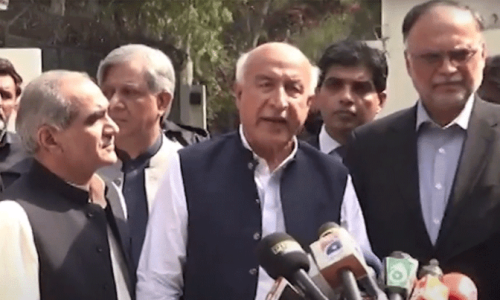ISLAMABAD: Academics and education researchers called for a non-biased curriculum on Friday.
Speaking at a session titled ‘Curriculum of Peace or Hate?’ during the Children’s Literature Festival on Friday, Amir Riaz, who researches in school curriculums and has authored a book on the matter, said there was much evidence of bias in textbooks.
He said: “For example, instances of bias against women: you will see pictures of boys flying kites or playing cricket while their sisters are making or serving food.”
Mr Riaz said this problem of bias against different groups was not just present in public curriculum, but was also scattered with examples in private school syllabus.
He thought there were several reasons for this and said privatisation was a big reason where “we think it is the only solution to every problem”.
“Textbook publishing houses have been privatised as well and they only publish books they think they will profit from,” he added.
The researcher blamed the concept of centralisation as well.
“Centralised government can only care so much about people participation. If you don’t include people in the decision-making process, things are going to go wrong.”
The author said we have to address these issues because we cannot set our children on the straight path if we don’t remove bias from textbooks.
Researcher Amir Riaz says these issues need to be addressed
Tahira Abdullah of the Pehli Kiran School agreed, and said our textbooks were very wrong. She said they did not show love, respect or plurality.
“Our curriculum and textbooks are very wrong. They do not show love, they do not show respect and they do not show plurality.”
She said the concept of us being divided as Shia, Sunni, Ahmedi, Christians and Hindus had to be removed.
“Let us instead include a concept of being human.”
Samina Imtiaz of the Peace, Education and Development Foundation helped along Ms Tahira’s point by talking of an incident in Peshawar University. Ms Imtiaz said during a visit of hers to the Peshawar University, an MA student, who was a Hindu, said that a fellow student had alleged in class that Hindus worship dengue mosquitoes.
The Hindu student then told Ms Imtiaz that a teacher joined in and agreed with the fellow student and commented, “What can one expect from people who worship a god with an elephant trunk.” The teacher and student were made to apologise but, Ms Imtiaz said: “The apology was offered because this happened in a sophisticated, formal institution. These sort of things happen every day in villages across the country.”
She said Islamiyat courses should be replaced with comparative religious studies.
“The word Islamiyat should not be used because we live in a country where people of different religions live together.”
Baela Raza of the Children’s Literary Festival said it was up to the students to make their voices heard.
“This situation about different types of bias in the curriculum has gotten too messy. Our curriculum is not what we want. Thinking about these changes makes your head hurt. Some policies have not been thought about at all and others have yet to be implemented. In the meanwhile, why don’t you, the children, raise your voice and tell policy-makers what you want?”
Samina Imtiaz, however, said the government did not have to do much other than read the reports already prepared and just make a decision.
In another session named ‘Article 25-A: Right to Education’ discussions about the right to education were discussed.
The Right to Education’s Syedul Hassan said Article 25 meant all children were entitled to free education but, “rights come with responsibilities. You have a responsibility to attend schools and do well”.
A debate about devising plans to get more children from low-income families into schools followed. The audience was asked what incentives should be offered to parents to let their child go to school instead of work.
Haroona Jatoi, a professor at Quaid-i-Azam University and an adviser to the government for education, said millions of children across the country had never seen the inside of a school and that it was imperative to get them into a classroom.
She said: “We need a mechanism to get 25-A to every corner of Pakistan.”
She said there was a huge gap between what the government said and what they did. The government had previously said all children between the ages of five and 16 will be going to schools by 2015, yet there are millions of children who have never set foot in a school before.
“It has been six years since devolution of power to the provinces has been announced for educational matters and they have not even drawn up their curriculum yet,” she said.
Published in Dawn, October 3rd , 2015
On a mobile phone? Get the Dawn Mobile App: Apple Store | Google Play












































